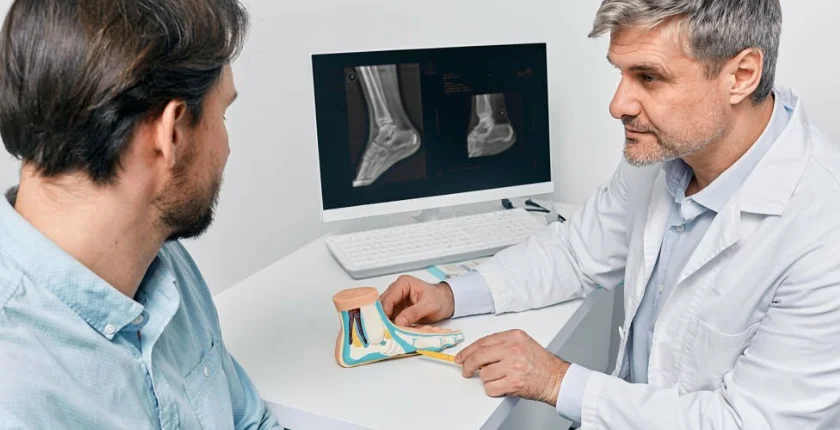Table of Contents
Introduction
Discover the motives behind the tension among orthopedic surgeons and Why Do Orthopedic Surgeons Hate Podiatrists within the medical discipline. Explore the underlying troubles and ability answers to this ongoing debate.
In the complex international of healthcare, the relationship among orthopedic surgeons and podiatrists has been a topic of ongoing debate and, at times, anxiety. This article delves into the motives at the back of the strained family members and seeks to shed mild on the dynamics at play. We’ll discover the perspectives of each orthopedic surgeon and podiatrist, aiming to provide a comprehensive understanding of why this problem exists and how it may be addressed.

The Dilemma: Why Do Orthopedic Surgeons Hate Podiatrists?
Understanding the tensions in the healthcare industry is crucial for fostering collaboration and better patient care. Let’s explore some key aspects that contribute to this issue.
| Reasons Behind Orthopedic Surgeons’ Dislike of Podiatrists |
|---|
| 1. Overlap in Expertise |
| 2. Scope of Practice |
| 3. Training Differences |
| 4. Referral Patterns |
| 5. Perception of Podiatry |
| 6. Financial Considerations |
Traditional vs. Specialized Expertise
Orthopedic surgeons hate podiatrists both deal with musculoskeletal issues, but their approaches and training differ. Orthopedic surgeons often treat a broader range of orthopedic issues, including fractures and trauma. In contrast, podiatrists specialize in foot and ankle problems. This specialization can lead to a perception among orthopedic surgeons that podiatrists lack the comprehensive training required for more complex cases.
Overlapping Scope of Practice
One of the core reasons for the tension between these two professions is the overlapping scope of practice. Both orthopedic surgeons hate that podiatrists can treat similar conditions, such as ankle fractures or tendon issues, leading to competition for patients. This overlap can create a sense of professional rivalry.

Differences in Medical Training
Orthopedic surgeons generally go through sizeable clinical training, including a scientific diploma and a residency in orthopedic surgical treatment. On the other hand, podiatrists whole a Doctor of Podiatric Medicine (DPM) application with a focal point on the foot and ankle. These variations in schooling can cause varying views on affected person care and remedy alternatives.
Related Post Nashville Business Journal
Patient Confusion
Patients may also play a role in this issue. Many individuals are unsure whether to consult an orthopedic surgeon or a podiatrist for their musculoskeletal problems. This lack of clarity can result in misdirected patient flows, causing frustration among both specialists.
Financial Factors
Financial considerations can exacerbate tensions. Healthcare reimbursement systems can favor one specialty over the other, leading to disputes over financial resources and compensation. These disputes can contribute to the strained family members among orthopedic surgeons who hate podiatrists.
Exploring Potential Solutions
While the tensions between orthopedic surgeons and podiatrists are complex, some solutions can promote collaboration and improve patient care.
Interdisciplinary Training
Encouraging interdisciplinary schooling packages can assist orthopedic surgeons and podiatrists in gaining a higher understanding of every different’s understanding. This can lead to extra effective collaboration on complicated instances and higher patient consequences.
Clearer Patient Education
Ensuring that sufferers apprehend the scope of practice for every area of expertise can lessen confusion and frustration. This can be executed through academic campaigns and materials that specify whether to are seeking the care of an orthopedic physician as opposed to a podiatrist.

Collaboration on Complex Cases
Orthopedic surgeons Hate podiatrists must collaborate on complicated instances that require each specialized skill. By working together, they can provide comprehensive care that benefits the patient.
Reimbursement Reform
Addressing the financial aspects of the issue is crucial. Healthcare systems should consider fair and equitable reimbursement models that do not favor one specialty over the other.
Final Thought
The anxiety among orthopedic surgeons who hate podiatrists is a multifaceted issue. It stems from differences in training, scope of practice, patient confusion, and financial factors. To deal with this hassle, the healthcare industry has to prioritize collaboration, interdisciplinary education, patient schooling, and fair repayment. By doing so, we can decorate patient care and foster a more harmonious running courting among these two critical medical specialties.

Common Questions
Why pick a podiatrist over an orthopedic health practitioner?
Podiatrists are specialists in foot and ankle care, while orthopedic surgeons are experts in preferred musculoskeletal problems. This way podiatrists have greater specialized training and revel in in treating foot and ankle situations. They also are more likely to be familiar with the present-day treatments and surgical strategies for these situations.
Why is podiatry not a medical uniqueness?
Podiatry is a scientific uniqueness, but it isn’t always diagnosed as such by using all clinical organizations. This is because podiatrists have a one-of-a-kind academic pathway than other physicians. Podiatrists should whole a 4-yr podiatry college program, accompanied by a 3-yr residency program. However, they no longer attend clinical school, which is required for different physicians.
Does Orthopaedics deal with feet?
Yes, orthopedic surgeons do address toes. However, in addition, they treat situations of different components of the musculoskeletal gadget, inclusive of the knees, hips, backbone, and shoulders. Podiatrists, on the other hand, solely deal with foot and ankle conditions.
What are the most difficult orthopedic surgeries?
Some of the most difficult orthopedic surgeries include:
– Spinal fusion
– Total joint replacement
– Pelvic reconstruction
– Tumor resection and reconstruction
– Pediatric orthopedic surgery
These surgeries are difficult because they are complex and require a high level of skill and experience.
What are the top 3 riskiest surgeries?
Some of the riskiest surgeries include:
-Heart surgery
-Brain surgery
– Open-chest surgery
These surgeries are risky because they have a high potential for complications, such as bleeding, infection, and death.

